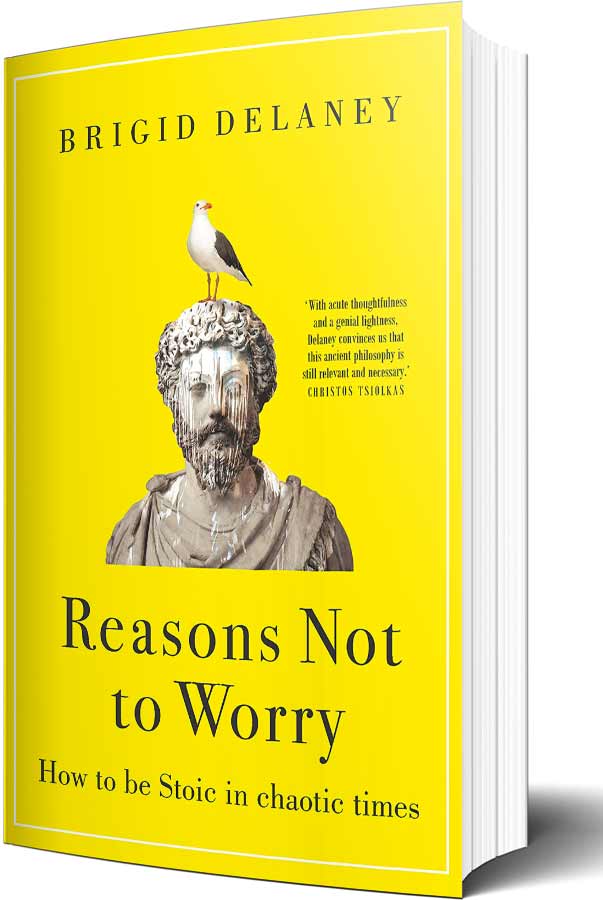Reasons Not to Worry
How to be Stoic in chaotic times
What is Stoicism?
If you had asked me five years ago, what do you think about this new emerging trend on living your life through the philosophy and practices of the ancient Stoics, my response would’ve been ‘What is Stoicism?’ More importantly, my default thinking back then was that being a Stoic was all about suppressing your emotions and simply excepting your lot in life through emotionless endurance – hardly an attractive philosophy to embrace.
At the end of 2019 just when I thought the world of work and life could not get any more chaotic and disruptive, a client suggested that I get on board Stoicism and read “The Challenge Is The Way” by Ryan Holiday. A book that I highly recommend you read, or at least jump on board Holiday’s podcasts and sign up for ‘The Daily Stoic’.
This was my first real in-depth introduction into the power of the ancient wisdom and philosophy of Stoicism: cultivating strength, insights, and wisdom to live an authentic life, all within our modern-day world of uncertainty and disruption.
How fortuitous and thrilling it was to discover on the eve of the Covid pandemic, how relevant (and how needed) were the four Stoic Virtues of Courage, Temperance, Justice, and Wisdom. In fact, I believe that these Stoic principles helped me navigate through some of the most tumultuous and challenging times, both personally and in business.
Stoicism was founded in Athens by Zeno of Citium in the early 3rd century BC and has long been considered the most practical of all philosophies. Stoicism was practiced by the likes of Epictetus, Cato, Seneca and probably most famously by the Roman Emperor, Marcus Aurelius.
At the very root of Stoic thinking there is a very simple, though not easy, way of living: Take the obstacles in your life and turn them into your advantage, control what you can and accept what you can’t.
“It’s not what happens to you, but how you react to it that matters.”
– Epictetus
Bridget Delaney
Brigid Delaney is an Australian Walkley Award winning journalist and has written for a range of publications including The Guardian, The Sydney Morning Herald, The Australian, The Age and The Monthly. Delaney is a lecturer in journalism and an author of three books.
Delaney has recently delivered an amazing ‘post pandemic’ version of modern-day Stoicism. It includes her backstory on how she began embracing Stoicism in 2018, to now having it as her guiding principles to live and lead an authentic and fulfilled life whilst eliminating unnecessary worrying!
Delaney states that unfortunately “in more recent times, the word Stoic has been flattened and bastardised, used to describe people who bottle up their emotions, repress their feelings and never cry”. Through her research she has discovered that the original Stoics were not like that at all. They enjoyed life, loved others and were very much a proactive part of the community who achieved amazing success in life, through action.
Focus on What You Control and Take Action (don’t worry about the rest!)
Delaney shares with us the importance of doing the ‘Stoic Control Test’ – determine the things you should worry about. If it’s related to your character, your actions and reactions or how you treat others then YES, worry about these things only. The great news is that these three areas are all within your control and as long as you take action, they can be transformed to your advantage.
For everything else in your life that is outside of your control it’s pointless to waste time and energy on these things – so stop worrying.
No one is Immune from Suffering
“The key to a fulfilling life is not to avoid pain and discomfort, but to learn to embrace them as part of the human experience.”
– Brigid Delaney
By embracing Stoicism, you realise that no one is immune from suffering, uncertainty, loss, grief, and that death is inevitable for us all. Stoicism is very pragmatic where you need to initially ‘square up’ to the human condition, especially the fate that we all must acknowledge, and that is death.
Be warned! If you are uncomfortable with conversations about confronting death this book will be unpleasant to read.
“Death is a central organising principle in Stoicism. If we realise we are going to die and then stop worrying about it, not only will we have a more relaxed life, but we will also have a more relaxed death.”
– Brigid Delaney
With our approach to life and to death, our reactions to these fears are in our control. It is all about our mindset and how we view the world and more importantly, how we respond to life’s most challenging situations.
Three Key Takeaways
After reading Delaney’s book, I was both reminded of the core Stoic principles and challenged to put them into practice. Among the many valuable insights, three Stoic concepts particularly resonated with me.
- Don’t suffer twice!
Stoics will tell you that you can’t avoid suffering. Bad stuff will continue to happen to us in life – that is suffering once. However many people suffer twice by getting caught up in the drama, feeling victimised and wanting to inflict damage or seek retribution – that’s suffering twice!
The Stoic idea of ‘amor fati’ or love of fate, encourages us to accept whatever happens in life and make the best of it. So whatever you do, don’t suffer twice! - It’s all about your Character
Delaney’s focus on the importance of Being of Character which she argues is ‘the cornerstone and the crucible’ of Stoic philosophy, is something that I loved!
When people treat us badly (which they will do on a regular basis – expect this and don’t be surprised), they are damaging their own character which you have no control over. What you do have control over, is the way that we respond and treat them through your ‘actions and reactions’. This is the time to ensure that you keep the integrity of your character in check by not reacting badly. In fact this is your opportunity to show your patience, tolerance, and empathy which all will improve your character. - Tranquillity Trumps Happiness
Delaney compels us to move ‘beyond the happiness myth’ by embracing the Stoic perspective of cultivating tranquillity. It is a more sustainable and meaningful goal in life than pursuing fleeting pleasure and happiness.
Developing tranquillity and resilience will foster a calm presence ‘that is like a new superpower’. You will become less reactive to chaotic events and things that you have no control over.
The great news is that this tranquillity, also known as ‘ataraxia’ by the Stoics, is not dependent on external circumstances. Rather it arises from an inner state of mind and is not easily disturbed by external events or fluctuations in life.
“The happiness of your life depends upon the quality of your thoughts.”
– Marcus Aurelius
Delaney’s book is brilliant! It highlights the root cause as to why worry and anxiety are so pervasive in our modern lives, whilst providing practical strategies within a Stoic roadmap for overcoming them.
Through a combination of deeply personal transformational stories, research and philosophical insights, Delaney makes a compelling case for the importance of staying present and focused on the here and now, rather than letting our worries about past regrets and our anxieties about the future drag us down.
Whether you struggle with chronic worry or just want to lead a more mindful, fulfilling and authentic life, this book offers valuable insights and guidance for building your character, whilst overcoming anxiety by living your life with greater tranquilly and purpose.
“When I found myself in tough places over the last few years,
I kept returning to the Stoics.”
– Brigid Delaney

Book review by:
Richard Dore - CEO, Proteus Leadership


